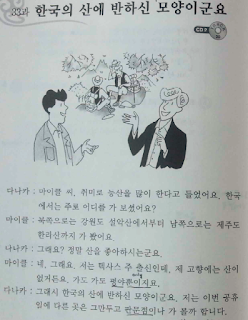Lv3 U34 Poetry and Song.| 반짝이다, 울긋불긋하다, 그립다, 옛 N grammar
Listening
34과 시와 노래
엄마야 누나야
--김소월--
엄마야 누나야 강변 살자
뜰에는 반짝이는 금모래 빛
뒷문 박에는 갈잎의 노래
엄마야 누나야 강변 살자
ㅡㅡㅡㅡㅡㅡㅡㅡㅡㅡㅡ
옹달샘
--윤석중--
깊은 산 속 옹달샘.
누가 와서 먹나요?
맑고 맑은 옹달샘.
누가 와서 먹나요?
새벽에 토끼가
눈 비비고 일어나
세수하러 왔다가
물만 먹고 가지요.
깊은 산 속 옹달샘.
누가 와서 검나요?
맑고 맑은 옹달샘.
누가 와서 먹나요?
달밤에 노루가
숨바꼭질 하다가
목마르면 달려와
얼른 먹고 가지요.
Vocabulary
강변 = riverside
뜰 = garden, yard
반짝이다 = sparkle, twinkle
금 = line; gold
모래 = sandy
빛 = light
뒷문 = rear door
갈잎 = fallen leaves
옹달샘 = a (small) spring pool
깊다 = deep
토끼 = rabbit
비비다 = mix, rub
달밤 = moonlit night
노루 = deer
숨바꼭질 = hide-and-seek
목마르다 = thirsty
달리다 = run, dash
Grammars and expressions
1. N아/야: Name (half talk)
영숙아, 학교에 빨리 가.
Youngsuk, go to school quickly.
민수야, 이리 와서 놀자.
Minseok, come here to play.
2. N이/가 반짝이다: N sparkles
하늘에서 별이 반짝입니다.
Stars are sparkling in the sky.
반짝이는 별이 아름다워요.
Sparkling stars are beautiful.
3. A-고 A-(으)ㄴ N: Emphasis on A (characteristic of N)
넓고 넓은 바닷가에서 아이들이 뛰어 놀고 있다.
Children are playing around the large and broad beach.
예날이 깊고 깊은 산 속에 할아버지 한 분이 살고 계셨습니다.
Long ago grandpa lived alone in deep mountain.
4. N을/를 비비다: To rub (hands, eyes)
그 사람은 손을 비비면서 얘기했어요.
That guy rubs his hands and talked.
눈이 가려워도 비비지 마세요.
Although your eyes are itchy, don't rub (using hands)
비빔밥은 잘 비벼서 먹어야 해요.
Mix the Pipimpap well then eat.
5. 울긋불긋하다: Various colors, colorful
우리 집 마당에는 여러 가지 꽃들이 울긋불긋 예쁘게 피었습니다.
At our home club, various flowers bloomed beautifully colorful.
가을이 되니까 산이 울긋불긋하게 물들었어요.
Since It's autumn, mountain is so colorful.
6. N이/가 그립다: To miss, long for N
특히 추석이나 설에는 고향이 그립습니다.
I miss my hometown especially at chuseok and new year.
아플 때는 가족이 그리워져요.
I miss my family when I am sick.
7. 옛 N: Old (memories) N
그분은 나이가 들어도 옛 모습이 그대로 있다.
Although that guy is old, his old appearance is still like that.
저는 한국의 옛 풍습에 관심이 많아요.
I have much interest in old Korean customs.
* 저기 보이는 집이 우리가 옛날에 살았던 집이에요.
The house that we see over there is the house that we lived long ago.
Translation
Lesson 34. Poetry and Song.
34과 시와 노래
--김소월--
뜰에는 반짝이는 금모래 빛
뒷문 박에는 갈잎의 노래
엄마야 누나야 강변 살자
--윤석중--
누가 와서 먹나요?
맑고 맑은 옹달샘.
누가 와서 먹나요?
눈 비비고 일어나
세수하러 왔다가
물만 먹고 가지요.
누가 와서 검나요?
맑고 맑은 옹달샘.
누가 와서 먹나요?
숨바꼭질 하다가
목마르면 달려와
얼른 먹고 가지요.
뜰 = garden, yard
반짝이다 = sparkle, twinkle
금 = line; gold
모래 = sandy
빛 = light
뒷문 = rear door
갈잎 = fallen leaves
옹달샘 = a (small) spring pool
깊다 = deep
토끼 = rabbit
비비다 = mix, rub
달밤 = moonlit night
노루 = deer
숨바꼭질 = hide-and-seek
목마르다 = thirsty
달리다 = run, dash
Youngsuk, go to school quickly.
Minseok, come here to play.
Stars are sparkling in the sky.
Sparkling stars are beautiful.
Children are playing around the large and broad beach.
Long ago grandpa lived alone in deep mountain.
That guy rubs his hands and talked.
Although your eyes are itchy, don't rub (using hands)
Mix the Pipimpap well then eat.
At our home club, various flowers bloomed beautifully colorful.
Since It's autumn, mountain is so colorful.
I miss my hometown especially at chuseok and new year.
I miss my family when I am sick.
Although that guy is old, his old appearance is still like that.
I have much interest in old Korean customs.
The house that we see over there is the house that we lived long ago.
<< I wanna live by riverside>>
엄마야 누나야
--김소월--
엄마야 누나야 강변 살자
뜰에는 반짝이는 금모래 빛
뒷문 박에는 갈잎의 노래
엄마야 누나야 강변 살자
ㅡㅡㅡㅡㅡㅡㅡㅡㅡㅡㅡ
--윤석중--
깊은 산 속 옹달샘.
누가 와서 먹나요?
맑고 맑은 옹달샘.
누가 와서 먹나요?
새벽에 토끼가
눈 비비고 일어나
세수하러 왔다가
물만 먹고 가지요.
깊은 산 속 옹달샘.
누가 와서 검나요?
맑고 맑은 옹달샘.
누가 와서 먹나요?
달밤에 노루가
숨바꼭질 하다가
목마르면 달려와
얼른 먹고 가지요.
--김소월--
뜰에는 반짝이는 금모래 빛
뒷문 박에는 갈잎의 노래
엄마야 누나야 강변 살자
<<The spring pool>>
옹달샘 --윤석중--
누가 와서 먹나요?
맑고 맑은 옹달샘.
누가 와서 먹나요?
눈 비비고 일어나
세수하러 왔다가
물만 먹고 가지요.
누가 와서 검나요?
맑고 맑은 옹달샘.
누가 와서 먹나요?
숨바꼭질 하다가
목마르면 달려와
얼른 먹고 가지요.
Label: K4T Level 3




